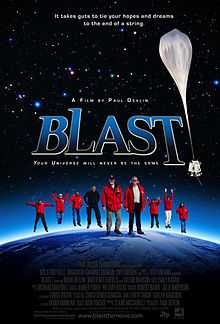BLAST! (2008 film)
| BLAST! | |
|---|---|
 Poster by Dan Chapman | |
| Directed by | Paul Devlin |
| Starring | Mark Devlin |
| Distributed by | Docurama |
Running time | 74 minutes |
| Country | USA |
| Language | English |
BLAST! is a feature-length documentary by Paul Devlin. The film follows a team of astrophysicists who launch a telescope, upon a high altitude balloon from northern Sweden and again from Antarctica.[1][2] The film follows the crew of scientists as they travel on a search to answer humankind's most basic question, how did we get here? An approach rarely seen in science programming, BLAST! de-emphasizes talking-head interviews and dispenses with anonymous narration in favor of capturing the action as it happens. Through dynamic storytelling, BLAST! reveals the human side of scientific pursuit, the personal sacrifices of scientists and the philosophical perspectives of discovering the origins of the universe.
History
BLAST! premiered at Hot Docs on Tuesday, April 22, 2008.[3] It is now playing at film festivals around the world. Festival screenings include:
- Sheffield Doc/Fest 2008
- Guangzhou International Documentary Film Festival
- Whistler Film Festival
- Documenta Film Festival
- Corona Cork Film Festival
- Bergen International Film Festival
- Imagine Science Film Festival
- Arctic Light Film Festival[4]
BLAST! has co-production partnerships with BBC 4’s documentary strand Storyville, Discovery Channel Canada, SVT Sweden, and YLE/FST Finland. The film will broadcast on Discovery Channel in February 2009. BLAST! has also been acquired by VPRO-Netherlands and DR2-Denmark.
The BLAST experiment
BLAST, the Ballon-borne-Large-Aperture Submillimeter Telescope, was a 2-metre telescope flown from a high-altitude balloon to observe submillimeter radiation emitted mostly by dust heated by young stars. It was created to address important extragalactic and Galactic questions regarding the formation and evolution of stars, galaxies and clusters.[5]
International Year of Astronomy 2009
As an official special project of the International Year of Astronomy 2009.[6] BLAST! will screen in communities around the world throughout 2009. The International Year of Astronomy 2009 is a global effort initiated by the International Astronomical Union and UNESCO, or United Nations Educational Scientific and Cultural Organization, to help the citizens of the world rediscover their place in the Universe through the day- and night-time sky, and thereby engage a personal sense of wonder and discovery. The International Year of Astronomy 2009 is endorsed by United Nations and International Council for Science.
Reception
Astrophysicist Neil deGrasse Tyson of the American Museum of Natural History and host of PBS NOVA scienceNOW commented on the film by saying, "In a rare combination of content and storytelling, BLAST! treats the viewer not only to the fruits of cosmic discovery but to the fits and starts of dedicated scientists who navigate paths of research that enable it."[7]
Tim Teeman from Times Entertainment said of the film "For those of us with bad memories of physics and chemistry class, it was inspirational and aspirational."[2]
Simon Horsford of The Telegraph UK wrote that the film is "A story that, in trying to answer age-old questions about how we got here, produces an intriguing dynamic between the two main scientists."[8]
References
- ↑ http://blogs.discovery.com/space_disco/2008/10/blast-yourself.html October 2010. Retrieved February 8, 2009.
- ↑ 2.0 2.1 http://entertainment.timesonline.co.uk/tol/arts_and_entertainment/tv_and_radio/article5467701.ece The Times Retrieved February 8, 2009.
- ↑ http://hotdocsaudience.bside.com/2008/films/blast_hotdocs2008 Retrieved February 8, 2009.
- ↑ http://www.blastthemovie.com/screenings.html Retrieved February 13, 2009.
- ↑ http://blastexperiment.info/ Retrieved April 28, 2009.
- ↑ BLAST! International Year of Astronomy. Retrieved February 13, 2009.
- ↑ http://www.blastthemovie.com/reviews.html Retrieved February 13, 2009.
- ↑ Simon Horsford; Pete Naughton; Gillian Reynolds (January 6, 2009). "Wednesday's television and radio highlights". The Daily Telegraph. Retrieved February 13, 2009.